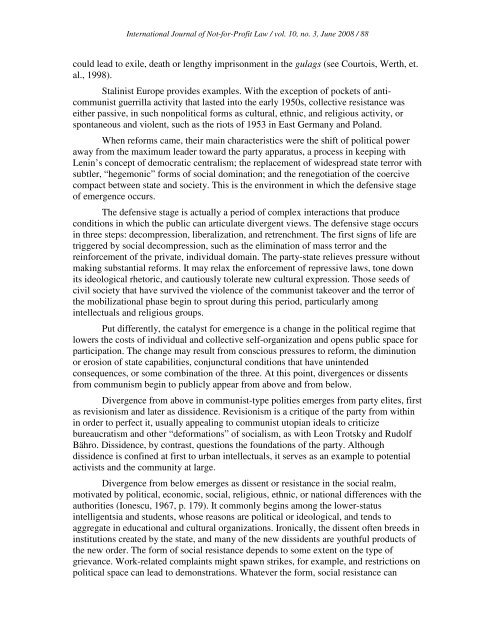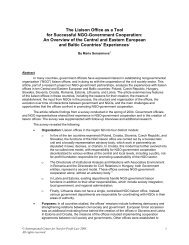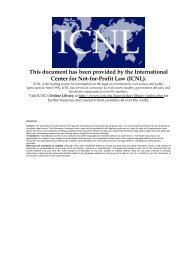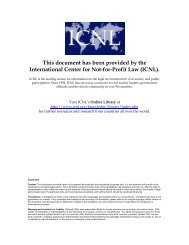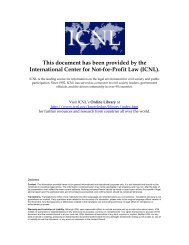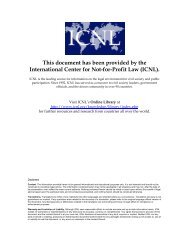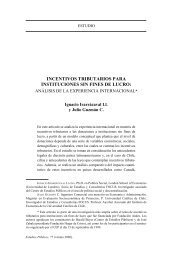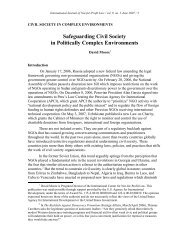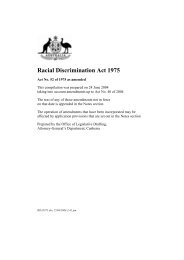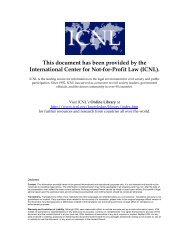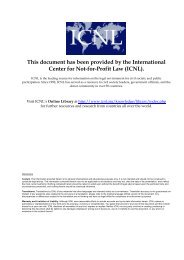Rising from the Ashes: The Rebirth of Civil Society in an ...
Rising from the Ashes: The Rebirth of Civil Society in an ...
Rising from the Ashes: The Rebirth of Civil Society in an ...
You also want an ePaper? Increase the reach of your titles
YUMPU automatically turns print PDFs into web optimized ePapers that Google loves.
International Journal <strong>of</strong> Not-for-Pr<strong>of</strong>it Law / vol. 10, no. 3, June 2008 / 88<br />
could lead to exile, death or lengthy imprisonment <strong>in</strong> <strong>the</strong> gulags (see Courtois, Werth, et.<br />
al., 1998).<br />
Stal<strong>in</strong>ist Europe provides examples. With <strong>the</strong> exception <strong>of</strong> pockets <strong>of</strong> <strong>an</strong>ticommunist<br />
guerrilla activity that lasted <strong>in</strong>to <strong>the</strong> early 1950s, collective resist<strong>an</strong>ce was<br />
ei<strong>the</strong>r passive, <strong>in</strong> such nonpolitical forms as cultural, ethnic, <strong>an</strong>d religious activity, or<br />
spont<strong>an</strong>eous <strong>an</strong>d violent, such as <strong>the</strong> riots <strong>of</strong> 1953 <strong>in</strong> East Germ<strong>an</strong>y <strong>an</strong>d Pol<strong>an</strong>d.<br />
When reforms came, <strong>the</strong>ir ma<strong>in</strong> characteristics were <strong>the</strong> shift <strong>of</strong> political power<br />
away <strong>from</strong> <strong>the</strong> maximum leader toward <strong>the</strong> party apparatus, a process <strong>in</strong> keep<strong>in</strong>g with<br />
Len<strong>in</strong>’s concept <strong>of</strong> democratic centralism; <strong>the</strong> replacement <strong>of</strong> widespread state terror with<br />
subtler, “hegemonic” forms <strong>of</strong> social dom<strong>in</strong>ation; <strong>an</strong>d <strong>the</strong> renegotiation <strong>of</strong> <strong>the</strong> coercive<br />
compact between state <strong>an</strong>d society. This is <strong>the</strong> environment <strong>in</strong> which <strong>the</strong> defensive stage<br />
<strong>of</strong> emergence occurs.<br />
<strong>The</strong> defensive stage is actually a period <strong>of</strong> complex <strong>in</strong>teractions that produce<br />
conditions <strong>in</strong> which <strong>the</strong> public c<strong>an</strong> articulate divergent views. <strong>The</strong> defensive stage occurs<br />
<strong>in</strong> three steps: decompression, liberalization, <strong>an</strong>d retrenchment. <strong>The</strong> first signs <strong>of</strong> life are<br />
triggered by social decompression, such as <strong>the</strong> elim<strong>in</strong>ation <strong>of</strong> mass terror <strong>an</strong>d <strong>the</strong><br />
re<strong>in</strong>forcement <strong>of</strong> <strong>the</strong> private, <strong>in</strong>dividual doma<strong>in</strong>. <strong>The</strong> party-state relieves pressure without<br />
mak<strong>in</strong>g subst<strong>an</strong>tial reforms. It may relax <strong>the</strong> enforcement <strong>of</strong> repressive laws, tone down<br />
its ideological rhetoric, <strong>an</strong>d cautiously tolerate new cultural expression. Those seeds <strong>of</strong><br />
civil society that have survived <strong>the</strong> violence <strong>of</strong> <strong>the</strong> communist takeover <strong>an</strong>d <strong>the</strong> terror <strong>of</strong><br />
<strong>the</strong> mobilizational phase beg<strong>in</strong> to sprout dur<strong>in</strong>g this period, particularly among<br />
<strong>in</strong>tellectuals <strong>an</strong>d religious groups.<br />
Put differently, <strong>the</strong> catalyst for emergence is a ch<strong>an</strong>ge <strong>in</strong> <strong>the</strong> political regime that<br />
lowers <strong>the</strong> costs <strong>of</strong> <strong>in</strong>dividual <strong>an</strong>d collective self-org<strong>an</strong>ization <strong>an</strong>d opens public space for<br />
participation. <strong>The</strong> ch<strong>an</strong>ge may result <strong>from</strong> conscious pressures to reform, <strong>the</strong> dim<strong>in</strong>ution<br />
or erosion <strong>of</strong> state capabilities, conjunctural conditions that have un<strong>in</strong>tended<br />
consequences, or some comb<strong>in</strong>ation <strong>of</strong> <strong>the</strong> three. At this po<strong>in</strong>t, divergences or dissents<br />
<strong>from</strong> communism beg<strong>in</strong> to publicly appear <strong>from</strong> above <strong>an</strong>d <strong>from</strong> below.<br />
Divergence <strong>from</strong> above <strong>in</strong> communist-type polities emerges <strong>from</strong> party elites, first<br />
as revisionism <strong>an</strong>d later as dissidence. Revisionism is a critique <strong>of</strong> <strong>the</strong> party <strong>from</strong> with<strong>in</strong><br />
<strong>in</strong> order to perfect it, usually appeal<strong>in</strong>g to communist utopi<strong>an</strong> ideals to criticize<br />
bureaucratism <strong>an</strong>d o<strong>the</strong>r “deformations” <strong>of</strong> socialism, as with Leon Trotsky <strong>an</strong>d Rudolf<br />
Bähro. Dissidence, by contrast, questions <strong>the</strong> foundations <strong>of</strong> <strong>the</strong> party. Although<br />
dissidence is conf<strong>in</strong>ed at first to urb<strong>an</strong> <strong>in</strong>tellectuals, it serves as <strong>an</strong> example to potential<br />
activists <strong>an</strong>d <strong>the</strong> community at large.<br />
Divergence <strong>from</strong> below emerges as dissent or resist<strong>an</strong>ce <strong>in</strong> <strong>the</strong> social realm,<br />
motivated by political, economic, social, religious, ethnic, or national differences with <strong>the</strong><br />
authorities (Ionescu, 1967, p. 179). It commonly beg<strong>in</strong>s among <strong>the</strong> lower-status<br />
<strong>in</strong>telligentsia <strong>an</strong>d students, whose reasons are political or ideological, <strong>an</strong>d tends to<br />
aggregate <strong>in</strong> educational <strong>an</strong>d cultural org<strong>an</strong>izations. Ironically, <strong>the</strong> dissent <strong>of</strong>ten breeds <strong>in</strong><br />
<strong>in</strong>stitutions created by <strong>the</strong> state, <strong>an</strong>d m<strong>an</strong>y <strong>of</strong> <strong>the</strong> new dissidents are youthful products <strong>of</strong><br />
<strong>the</strong> new order. <strong>The</strong> form <strong>of</strong> social resist<strong>an</strong>ce depends to some extent on <strong>the</strong> type <strong>of</strong><br />
griev<strong>an</strong>ce. Work-related compla<strong>in</strong>ts might spawn strikes, for example, <strong>an</strong>d restrictions on<br />
political space c<strong>an</strong> lead to demonstrations. Whatever <strong>the</strong> form, social resist<strong>an</strong>ce c<strong>an</strong>


